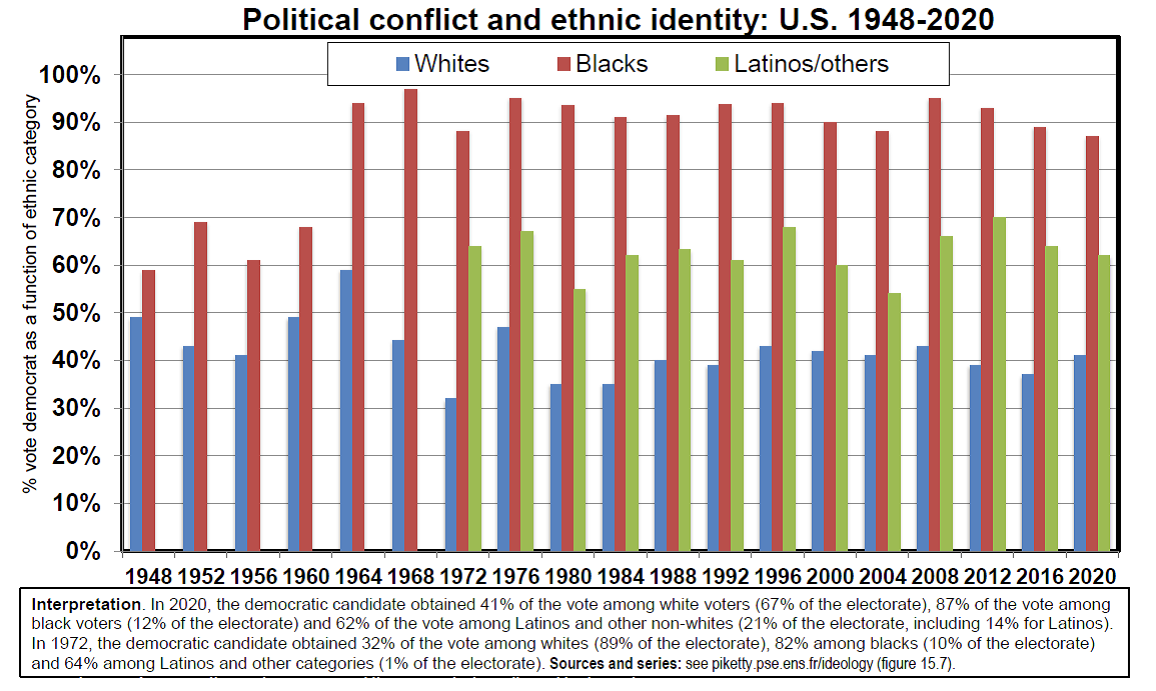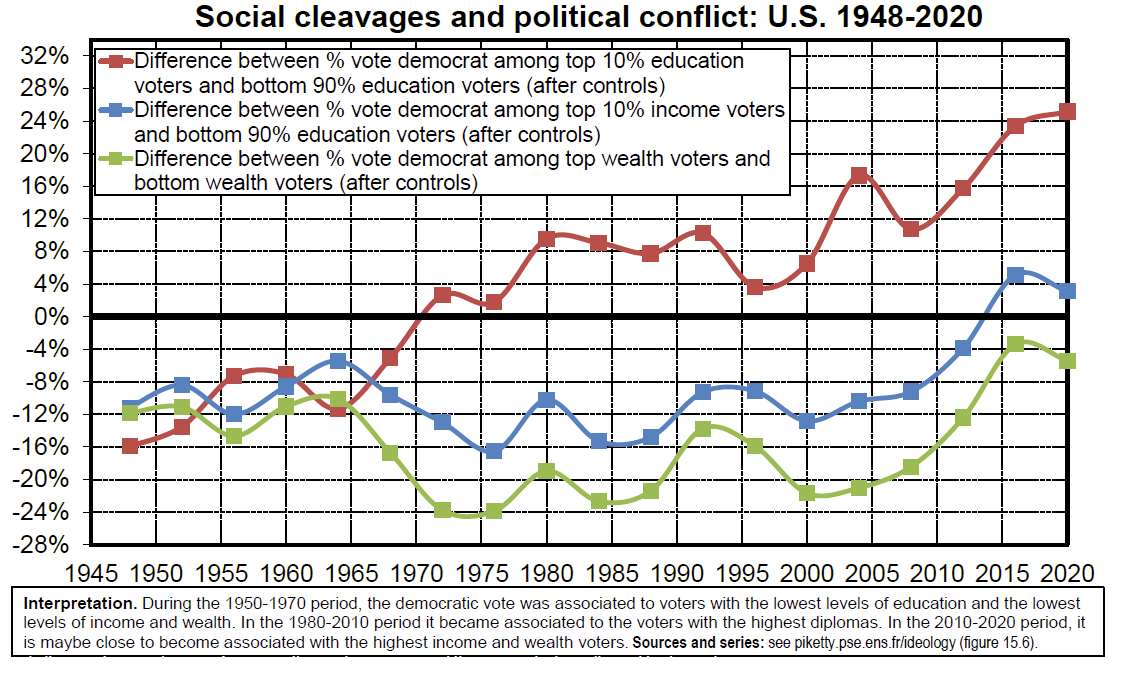After the invasion of Capitol Hill, the bewildered world wonders how the country that has long presented itself as the self-proclaimed leader of the « free » world could have fallen so low. To understand what has happened, it is urgent to leave the myths and idolatry on one side and to go back to history. In reality, the Republic of the United States has, since its beginnings, been run through by weaknesses, violence and considerable inequalities. The Confederate flag, the emblem of the pro-slavery South during the Civil War of 1861-1865, which was waved a few days ago by the rioters on the floor of the federal parliament was not there by chance. It refers to very heavy conflicts that need to be confronted. The system of slavery played a central role in the development of the United
Topics:
Thomas Piketty considers the following as important: in-english, Non classé
This could be interesting, too:
Thomas Piketty writes Regaining confidence in Europe
Thomas Piketty writes Trump, national-capitalism at bay
Thomas Piketty writes Democracy vs oligarchy, the fight of the century
Thomas Piketty writes For a new left-right cleavage
 After the invasion of Capitol Hill, the bewildered world wonders how the country that has long presented itself as the self-proclaimed leader of the « free » world could have fallen so low. To understand what has happened, it is urgent to leave the myths and idolatry on one side and to go back to history. In reality, the Republic of the United States has, since its beginnings, been run through by weaknesses, violence and considerable inequalities.
After the invasion of Capitol Hill, the bewildered world wonders how the country that has long presented itself as the self-proclaimed leader of the « free » world could have fallen so low. To understand what has happened, it is urgent to leave the myths and idolatry on one side and to go back to history. In reality, the Republic of the United States has, since its beginnings, been run through by weaknesses, violence and considerable inequalities.
The Confederate flag, the emblem of the pro-slavery South during the Civil War of 1861-1865, which was waved a few days ago by the rioters on the floor of the federal parliament was not there by chance. It refers to very heavy conflicts that need to be confronted.
The system of slavery played a central role in the development of the United States, and indeed of Western industrial capitalism as a whole. Of the fifteen presidents who succeeded one another until Lincoln’s election in 1860, no fewer than eleven were slave owners, including Washington and Jefferson, both of whom were born in Virginia, which in 1790 had a population of 750,000 (of which 40% were slaves), equivalent to the combined population of the two most populous northern states (Pennsylvania and Massachusetts).
After the 1791 revolt in Santo Domingo (the jewel in the French colonial system and the biggest concentration of slaves in the Atlantic world at the time), the south of the United States became the world centre of the plantation economy and underwent rapid growth. The number of slaves quadrupled between 1800 and 1860; cotton production increased tenfold and fed the European textile industry. But the North-East of the USA and especially the Mid-West (the birthplace of Lincoln) developed even more rapidly. These two groups relied on a different economic model, based on the colonisation of the West and free labour, and wanted to block the expansion of slavery in the new territories in the West.
After his 1860 victory, Lincoln, a Republican, was ready to negotiate a peaceful and gradual end to the slaveholders, with compensation for the owners, as had happened during the British and French abolitions in 1833 and 1848. But the Southerners preferred to play the secession card, like some of the white settlers from South Africa and Algeria in the 20th century, in an attempt to preserve their world. The Northerners refused their departure, and the war began in 1861.
Four years later, and after the death of 600,000 persons (as many as the cumulative total of all the other conflicts in which the country took part, including the World Wars, Korea, Vietnam and Iraq), the conflict ended with the surrender of the Confederate armies in May 1865. But the Northerners did not consider the Black population were ready to become citizens, let alone property owners, and they let the Whites regain control of the South and impose a strict system of racial segregation, which was to allow them to retain power for another century, until 1965.
In the meantime, the United States became the world’s leading military power and was able to put an end to the cycle of nationalist and genocidal self-destruction which opposed the European colonial powers against each other between 1914 and 1945. The Democrats, who were the party of the erstwhile pro-slavery South, managed to become the party of the New Deal. Driven by communist challenge and African-American mobilization, they conceded civil rights without reparations.
But as from 1968, the Republican Nixon recovered the white Southerners’ vote by denouncing the social largesse that the Democrats would grant to blacks through clientelism (a little like the way in which the right-wing in France suspects the left of Islamo-leftism when it evokes anti-Muslim discrimination).
A major reversal of the alliance as then took place, amplified by Reagan in 1980 and Trump in 2016. Since 1968, Republicans have won a clear majority of the white vote in all presidential elections, while Democrats have always obtained 90% of the black vote and 60-70% of the Latino vote. Meanwhile, the share of whites in the electorate has steadily declined from 89% in 1972 to 70% in 2016 and 67% in 2020 (against 12% for Blacks and 21% for Latinos and other minorities), fuelling the hardening of the Capitol’s Trumpists and threatening to plunge the Republic of the United States into an ethno-racial conflict with no way out.
What can we conclude from all this? According to a pessimistic reading, supported by many of the most educated groups who henceforth vote for the Democrats (which allows the Republicans to present themselves now as anti-elite, even though they continue to include a good part of the business elite, if not as yet appealing to the intellectual elite), Republican voters are described as « deplorable » and ‘beyond redemption’. Democratic administrations are said to have done everything they could to improve the lot of the most disadvantaged, but the racism and acrimony of the white working classes apparently prevents them from seeing it.

The problem is that this vision leaves little room for a democratic solution. A more optimistic approach to human nature might be as follows. For centuries, people from different ethno-racial backgrounds have lived with no contact with each other except through military and colonial domination. The fact that they have recently been living together in the same political communities is a major civilisational advance. But it continues to give rise to prejudice and political exploitation that can only be overcome by more democracy and equality.
If the Democrats want to regain the socially disadvantaged vote, whatever its origin, then more needs to be done in terms of social justice and redistribution. The road ahead will be long and arduous. All the more reason to get started now.
